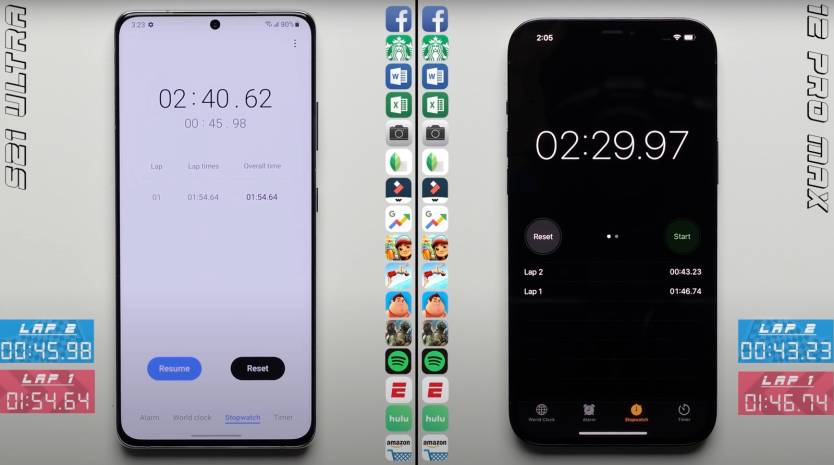- A Galaxy S21 Ultra vs. iPhone 12 Pro Max speed test compares the new Snapdragon 888 processor’s performance against Apple’s A14 Bionic.
- Both processors are built on the same 5nm process, with Qualcomm’s Snapdragon 888 expected to power several iPhone 12 rivals this year.
- The speed test shows that the Galaxy S21 can’t outperform the iPhone 12, but the results are much closer than you might expect considering how badly iPhones have beaten rivals in similar tests in the past.
The Galaxy S21 series is the first Android flagship lineup of the year that can rival the newest iPhones. The S21 versions feature 5nm chips, just like the A14 Bionic that powers Apple’s iPhone 12 models. Samsung’s new phones pack either the Snapdragon 888 processor from Qualcomm or the Exynos 2100 from Samsung, depending on the region. Tests so far showed that it’s the Snapdragon 888 that’s the better version of the two, although the chips are built on similar ARM technology.
Benchmark tests also showed that the Galaxy S21 can’t match the iPhone 12’s performance, but the S21 will still deliver the fastest Android experience available right now. Now, real-life speed test results are finally available, and the iPhone’s margin of victory isn’t quite as wide as you might expect if you’ve seen similar tests in the past.
Real-life speed tests that always pop up following the releases of new iPhone and Android devices attempt to give us an idea of how smartphones match up during daily life. Using apps, dealing with files, and multitasking are the kinds of functions you perform all the time on your smartphone. That’s why these speed tests have been standardized online to mimic those experiences as closely as possible.
Plenty of YouTubers conduct these unscientific smartphone speed tests in the same way. The tests involve opening the same set of apps in the same order on an iPhone and an Android phone, and measuring the time it takes to load each app. That’s just the first round. In the second round, the same set of apps is reopened to see whether they stayed open in memory or whether the phone has to reload them. The second lap’s time is also recorded.
One of the most consistent speed test comparisons comes from the YouTube channel PhoneBuff, which employs a robotic arm to navigate the interface of each device. In this case, we’re looking at the Galaxy S21 Ultra and the iPhone 12 Pro Max, the top of the line Galaxy S21 and iPhone 12 versions, respectively.

The test shows that the Galaxy S21 Ultra can hold its own against the iPhone 12 Pro Max, especially with less demanding apps. When it comes to processing larger files and games, it’s the iPhone 12 that’s slightly faster. The iPhone 12 model wins the first lap, but the contest seems closer than before.
Android phones did have an advantage over some older iPhones in the second lap. Android handsets feature a lot more RAM than iPhones, which generally means that more apps will stay loaded in the background. But Apple bumped up the RAM on its Pro phones to 6GB, which proved to be the kind of upgrade the iPhone needed. The Note 20 vs. iPhone 12 speed test showed how important the RAM upgrade was for the iPhone, with the iPhone 12 Pro Max beating Samsung’s flagship with ease. The current comparison is further proof of that.
With just 6GB of RAM on board, the iPhone 12 Pro Max needs less time to reopen the same apps as the Galaxy S21 Ultra and its 12GB of memory. The iPhone wins both rounds, with the S21 Ultra finishing the test some 11 seconds later.
In practice, this means the iPhone 12 will be marginally faster than the Galaxy S21 phones, and that Qualcomm and Samsung are still trailing Apple when it comes to mobile chips. But only people who own both devices will notice any differences in real-life use.
The full video follows below.








